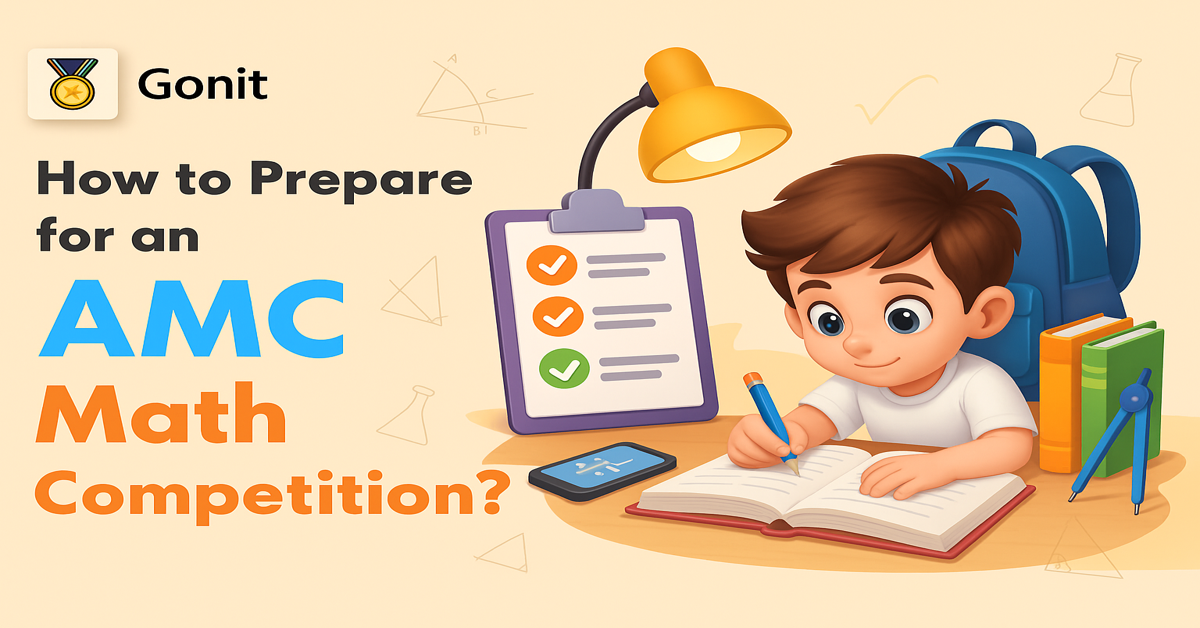The American Mathematics Competitions (AMC 8, 10, and 12) challenge students to think creatively and sharpen problem-solving skills.
Preparing well matters. A good AMC score can help you qualify for the next level, strengthen college applications, and most importantly, build confidence and a love for math.
So, how to prepare for AMC? This guide will break it down, scoring, what counts as a good score, and practical tips to prepare smarter for the AMC 8, 10, or 12.
Understanding the AMC Series
The American Mathematics Competitions (AMC) are offered at three main levels, each designed for different grade ranges and age groups:

- AMC 8 → For students in grade 8 and below (under 14.5 years old). It consists of 25 multiple-choice questions and is timed for 40 minutes, focusing on middle school math.
- AMC 10 → For students in grade 10 and below (under 17.5 years old). It includes 25 questions in 75 minutes, covering high school math up through precalculus.
- AMC 12 → For students in grade 12 and below (under 19.5 years old). It also has 25 questions in 75 minutes, but with more advanced topics like trigonometry and complex numbers.
To learn more about the types of problems AMC students face, you can read
👉 What Type of Questions Are Asked in Math Olympiads?
The scoring systems differ, too. On the AMC 8, each correct answer is worth 1 point, and there’s no penalty for guessing.
On the AMC 10 and 12, correct answers are worth 6 points, blanks earn 1.5 points, and wrong answers get 0, making strategy just as important as knowledge.
If you’re unsure whether you are eligible, check
👉 What Is the Age Limit for AMC 10?
Because of these differences, preparation strategies vary. For AMC 8, the focus is on building strong foundations and problem-solving confidence.
For AMC 10 and 12, students need deeper conceptual understanding, advanced algebra and geometry skills, and smart time management.
In short: AMC 8 introduces you to competition math, while AMC 10 and 12 prepare you for higher-level contests like the AIME.
Core Preparation Strategies for AMC Math Competitions
Getting ready for the AMC 8, 10, or 12 isn’t just about solving math problems; it’s about building smart habits that improve both accuracy and confidence.
For a deeper look at Olympiad strategies, you can also explore:
👉 How to Get Better at Solving Math Olympiad Questions?
Here are the key strategies to prepare effectively:

Practice with Past Papers
Working through previous AMC exams is one of the best ways to prepare. Past papers help you:
- Recognize the style and difficulty of questions.
- Get used to pacing during the 25-question format.
- Spot recurring problem types in algebra, geometry, number theory, and combinatorics.
If you want free, structured practice, try:
👉 FREE Math Olympiad Training Online
Don’t just check answers—analyze your mistakes. Write them down in an error log so you can track progress and target weak areas.
Strengthen Problem-Solving Skills
A good score comes from more than memorizing formulas. Focus on:
- Core topics: algebra, geometry, number theory, and combinatorics.
- Developing creative problem-solving and logical reasoning.
- Using resources like Art of Problem Solving (AoPS), math clubs, or problem-solving books to build deeper understanding.
This way, you’ll be ready not only for familiar problems but also for new and tricky ones.
For guidance on Olympiad-style thinking, see:
👉 How Can I Prepare for Math Kangaroo Effectively?
Time Management & Test Strategies
Success on AMC also depends on how you use your time:
- Solve the easier problems first to secure points.
- For AMC 10/12, remember the scoring rule: 6 points for correct, 1.5 for blank, 0 for wrong. That means sometimes it’s smarter to skip than to guess wildly unless you can narrow choices down.
- Always leave time to double-check your work to avoid careless mistakes.
To understand the AMC registration and scoring process better, read:
👉 How Do I Register for the AMC Math Competitions?
Simulate Real Exam Conditions
Practicing in a timed, distraction-free setting trains your brain and reduces test-day nerves.
Try full-length practice sessions to build stamina, sharpen focus, and adjust to time pressure.
By combining past paper practice, strong problem-solving habits, smart time management, and realistic test simulations, you’ll be well-prepared to walk into the AMC with confidence and maximize your performance.
Recommended Study Resources for AMC Preparation
Preparing for the AMC 8, 10, or 12 is easier when you have the right tools. Here are some of the best resources to guide your practice:
If you want to compare AMC to other exams, see:
👉 What Is the Syllabus for the AMC Maths Competition?

Art of Problem Solving (AoPS)
AoPS is the gold standard for math contest prep. Their books cover key topics like algebra, counting & probability, and problem-solving strategies.
The AoPS online classes and active community forums give you interactive learning and peer support.
Additionally, the AoPS Wiki offers past AMC problems, detailed solutions, and a vast library of competition math resources.
Gonit App
The Gonit App is a mobile-friendly tool built for AMC and IMO prep. It offers structured practice sessions, personalized problem sets, and progress tracking, perfect for students who want to sharpen skills anytime, anywhere.
For younger students, see:
👉 IMO Syllabus for Class 1
Official MAA Resources & AMC Archives
The Mathematical Association of America (MAA) hosts official past exams, solutions, and scoring guidelines on its website.
These archives are essential for realistic practice and spotting exam trends over the years.
Online Math Communities
Joining forums like the AoPS Community or participating in school math clubs allows you to discuss problems, share strategies, and learn from others.
Collaborative learning not only builds skills but also keeps motivation high.
Math Prep Books & Problem Collections
Beyond AoPS, classic books like “Competition Math for Middle School” by Jason Batterson and “The Art and Craft of Problem Solving” by Paul Zeitz provide excellent problem sets and strategy insights.
Broader problem collections also give variety and depth to your preparation.
Using a mix of resources—books, apps, official archives, and communities creates a well-rounded prep plan that builds both knowledge and confidence for AMC success.
Study Plan Examples for AMC Preparation
How you prepare for the AMC depends on your grade level and goals.
Here’s a breakdown of what works best for AMC 8, AMC 10, and AMC 12 students.

Middle School (AMC 8)
If you’re preparing for the AMC 8, the focus should be on building strong foundations and developing confidence.
Key areas include:
- Arithmetic and pre-algebra
- Geometry basics
- Number theory
- Introductory combinatorics
Start with easier problems and gradually move to more challenging ones. Exposure to a wide variety of problem types helps you think flexibly and reason more creatively.
High School (AMC 10/12)
For the AMC 10 and 12, preparation is about balancing content mastery and strategy. Focus on:
- Algebra, geometry, number theory, and combinatorics at a deeper level
- Solving problems that push analytical and creative thinking
- Taking timed practice exams to build stamina
- Reviewing mistakes carefully to refine problem-solving skills
Timed, full-length tests are especially important at this level to simulate real exam pressure.
To build problem-solving mindset, check:
👉 How to Get Better at Solving Math Olympiad Questions?
Sample Weekly AMC Study Schedule
- Day 1: Focus on one topic (e.g., algebraic equations or geometry).
- Day 2: Solve a mix of problems from past AMC papers.
- Day 3: Review solutions in detail and revisit tricky concepts.
- Day 4: Do a timed practice session under exam-like conditions.
- Day 5: Explore new problem-solving strategies or join a study group/forum.
- Day 6: Light practice and formula reinforcement.
- Day 7: Rest or review key concepts.
Consistency is key. A steady routine with regular self-checks not only raises your score but also builds the problem-solving habits you’ll need for the AIME and beyond.
FAQs on AMC Preparation
🔹 How long should I study for the AMC?
It depends on your level and background, but most students benefit from several weeks to a few months of preparation.
Aim for 3–6 hours of weekly practice, focusing on quality problems, concept mastery, and steady progress without burning out.
🔹 Is AMC 10 harder than AMC 12?
No—AMC 12 is more advanced. It covers additional high school topics like trigonometry and complex numbers, while AMC 10 stops at precalculus.
AMC 10 is meant for students up to grade 10, while AMC 12 targets students through grade 12.
🔹 Can you prepare for AMC without a coach?
Absolutely. Many students succeed through self-study with past AMC papers, Art of Problem Solving (AoPS) resources, official MAA materials, and online forums.
A coach can helpYes—, especially selective colleges and STEM programs. Strong AMC scores show problem-solving ability, persistence, and mathematical talent.
While not the only admissions factor, they can strengthen your application and even help with scholarships.guide you, but it’s not required.
🔹 Do colleges care about AMC scores?
Yes, especially selective colleges and STEM programs. Strong AMC scores show problem-solving ability, persistence, and mathematical talent.
While not the only admissions factor, they can strengthen your application and even help with scholarships.
🔹 What is the best book for AMC preparation?
The Art of Problem Solving (AoPS) series is the most recommended, with books on algebra, number theory, and problem-solving strategies.
Other excellent options include “Competition Math for Middle School” by Jason Batterson and “The Art and Craft of Problem Solving” by Paul Zeitz.
Conclusion
AMC success comes from consistent practice, smart strategies, and a positive mindset.
A good score shows growth and progress, so stay curious, keep practicing, and enjoy the journey of problem-solving.
For more AMC-specific guidance, explore:
👉 How Do I Register for the AMC Math Competitions?
👉 AMC Syllabus
👉 Free Online AMC Training





